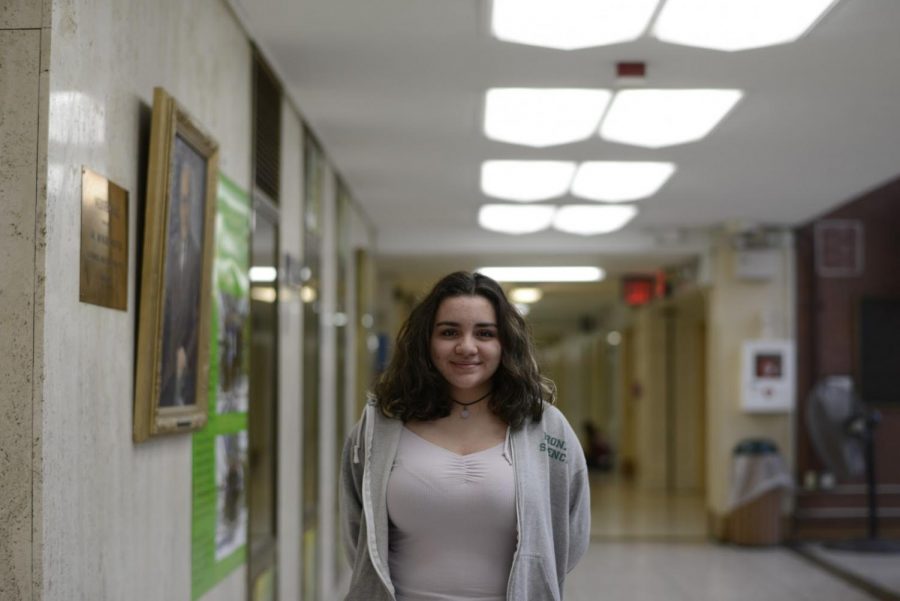Beyond the Walls of Bronx Science
Students at Bronx Science share their family traditions
Aline Marrero ‘20 shares her part of the family story.
Students in Bronx Science are well aware of each others academic performance within the school walls. However, beyond them, students live in a very different and undisclosed world. Sharing different students’ lifestyles will help us to better understand each other’s character.
Before leaving for school and upon returning home, students maintain many customs. For example, a number of students, such as myself, enter their home with their right foot. Others make sure to recite prayers before eating and sleeping with their family members. Such practices include making sure to say “buon appetito” in recognition of their Italian culture, or reciting the Sh’ma prayer before bed in acknowledgement of their Jewish background. These practices can be a result of religious beliefs, cultural practices, or superstition. Such customs are maintained routinely.
“I speak Portuguese with my mom and sister, which in itself entails a whole different way of explaining one’s day. During dinner, which we try to eat together as much as possible, we have to talk about our days and things that we learned,” said Aline Marrero ’20.
There are also many complex traditions that Bronx Science students uphold . Some traditions require students’ strong dedication and their commitment outside of school. For example, some students pray five times a day by means of strengthening their faith. Some others prostrate in front of their parents or elderlies, as a way to show respect.
Unique customs are also maintained during special holidays. Many people celebrate Eid with new clothes and indulge themselves at the end of the thirty days of fasting. Christmas is also celebrated by exchanging gifts and sharing food. Some Christmas traditions include unique features. For example, some families build a pesebre for Christmas. A pesebre is a miniature town, constructed with many details to represent the birth of Jesus. Many others count down the nights of Christmas with their families, waiting for the clock to hit midnight to finally hand out gifts and celebrate. Aside from religious holidays, students also celebrate cultural holidays, such as “La Befana,” Independence Day, Lunar New Year, and many more.
For some, language creates a barrier between students and their parents. At school, students only speak a world language in their world language class. However upon returning home, they often speak a different language that allows them to communicate with their family. This difference is not visible in school, but students in Bronx Science make sure to maintain their language skills outside of school in order to connect with their families. The get to experience a bilingual life.
“I speak Portuguese with my mom and sister, which in itself entails a whole different way of explaining one’s day. During dinner, which we try to eat together as much as possible, we have to talk about our days and things that we learned,” said Aline Marrero ’20. “My mom feels that it connects us as a family and as people, which is how Argentinians do it.”
Language barriers between families have always been a concern. Marrero explains that speaking in Portuguese is essential in communicating with her family. For her, speaking in her own language defines her Argentine background. It also allows her to share her daily experiences with her family members, which strengthens their bond.
Families also preserve certain festivals that are not often celebrated in the American culture. They celebrate festivals that are unique to them outside of their home.
“There’s a time in February in Ecuador where people have a ‘carnival.’ They play pranks and throw white powder at each other,” said Jessica Jimenez ‘20.“On that same day, my family gets together and we reenact the celebration. We get baby powder, and we start throwing it at each other. It’s a yearly tradition, and it’s always exciting. We play Ecuadorian music in the background and play around.” For Jimenez, preserving unique traditions is essential. It allows her family to bond.
Maintaining their ethnic background allows our students to broaden their moral compass, to understand basic human nature, and to develop social skills.
“Brazilian people are generally very social and affectionate, and my mom brought us up with that kind of culture. I try to be as empathetic as I can be, but I also try to be as aware of other people’s cultures as well, because I understand other cultures have different values when it comes to social interactions and such,” said Marrero.
Students are always defined by how they perform in school and how they perform academically. However, the very same students are also defined by their diverse backgrounds. Everyone here at Bronx Science is different, and how they are behind its walls defines who they are in the real world. Students here at Bronx Science are characters to their own story. Being aware of each others’ traditions and backgrounds only enlightens us more.
Afifa Areya is the Chief Graphic Designer and a Staff Reporter of ‘The Science Survey.’ She finds that journalistic writing gives her the ability...

